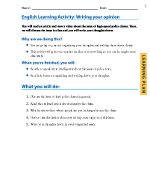Inference & Inferential Questions
Printable guide

Click to download the printable guide
Video
When you use your knowledge and experience to figure something out, you're using inference.
Inferential questions are questions that require you to infer to get the answer. The other kind of question is a literal question, which doesn't require you to infer.
Here are some examples of inferential thinking:
- You see smoke, and you infer fire, even though you didn't see the fire.
- On a sunny day, you see some kids with wet clothes near a lake. You infer that they were playing in the lake, even though you didn't see them playing in the lake.
- You come home and see a bunch of trees blown over into the street, leaves and branches everywhere, and your neighbors all outside pointing and talking. You infer that a violent storm recently blew through the neighborhood, even though you didn't see it.
- Your teacher comes into the classroom. He's walking slowly, his nose is red, he's sneezing, and carrying a box of tissues. You infer that he has a cold, even though he didn't say anything yet.
Now let's say that you were incapable of inference; in other words, you had to see something with your own eyes or be told something specifically before you knew it. Here's how the above 4 little scenarios would work:
Because you don't "do" inference, and you only think of things literally:
- You see smoke, and you don't think about fire. You only see the smoke.
- On a sunny day, you see some kids with wet clothes near a lake. Someone asks you, "Do you think the kids were playing in the lake?" You reply, "No."
- You come home to blown-over trees, and leaves, twigs, and branches everywhere on the ground. You ask a neighbor, "What happened?"
- You see your red-nosed, sneezing teacher. You ask him, as he sneezes again, "Why are you carrying a box of tissues?
Next steps
First, think of your favorite movie, book, or TV show. What are the main conflicts? If you can think of one or two, then you're on your way to become a master of conflict. Click on the Brainsheet on the top of this page to read more about conflict and show your teacher you "get it." You can also watch the video, above, to learn about conflict.